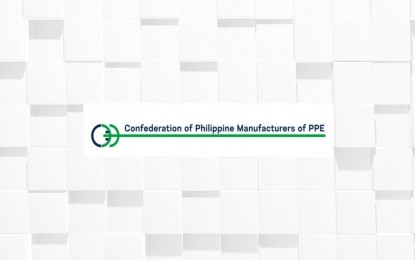
MANILA – Member companies of the Confederation of Philippine Manufacturers of PPE (CPMP) are adding USD36 million investments to ramp up their production of medical-grade personal protective equipment (PPE) to serve the local demand.
In a virtual press conference Friday, CPMP executive director Rosette Carillo said this is on top of the USD35-million investments when the manufacturing companies repurposed their factories to make PPE.
CPMP is composed of Medtecs International Corp. Ltd., EMS Components Assembly Inc., Reliance Producers Cooperative, Luen Thai International Group Philippines, Inc., and Tacca Industries Pty Ltd.
EMS chairman and chief executive officer Perry Ferrer said the company has started to pour in additional investments, while Australian firm Tacca is bringing in manufacturing of non-woven fabric used in surgical masks and Luen Thai is also investing to localize the production of PPE components.
“With the expansion of the program, we can increase it to another USD36 million and 4,000 workers,” Carillo said.
At the onset of the pandemic, the domestic market had a shortage of medical-grade PPE to protect the healthcare workers while they were attending to Covid-19 patients.
There are no PPE manufacturers in the Philippines except for Medtecs, which is engaged in manufacturing and exporting surgical masks.
This is when the four other member firms of CPMP, as well as the Confederation of Wearable Exporters of the Philippines, heeded the call of the government to locally produce much needed PPE such as medical-grade N88 face masks, N95 masks, coveralls, isolation gowns, gloves, head and shoe covers amid the pandemic.
For instance, Reliance and EMS converted 12 percent and 18 percent, respectively, of their factories into PPE making.
In the past three months, CPMP has invested USD35 million and retained 7,450 jobs despite the challenging business environment.
Gap in procurement
However, there has been a gap between the local supply and the largest source of demand –the government.
“Key challenge is the demand. The biggest customer for PPE is the Philippine government at this point,” CPMP president Lawrence delos Santos said. “And the problem we are facing, the way (the) government secures and procures is not necessarily in sync with our production.”
Delos Santos cited that for instance, the procurement will involve demand for 200 million surgical masks that shall be delivered immediately, but the local production can only supply 57 million pieces a month.
Trade Undersecretary Ceferino Rodolfo said this does not mean the local industry cannot meet the demand of the government, as companies can double or triple their shifts which can generate more jobs to meet the required volume.
Coordination between the government and industry should be strengthened so the manufacturers can serve the demand from the Department of Health, added Rodolfo.
“Right now, government procurement is heavily 99 percent or 98 percent of what they purchased are actually mainly imported because it’s just easy to find an importer,” delos Santos said.
Imported PPE products are cheaper
It was noted that prices of imported PPE, mainly coming from China, are cheaper than locally manufactured PPE.
Rodolfo said the government procurement tends to favor the lowest price. China-made surgical masks can be bought at PHP3 to PHP7 per piece compared to Philippine-made medical-grade masks at around PHP10.
But CPMP members cautioned the government of the quality of the imported sets of PPE that are being provided to medical workers.
Rodolfo said the country has no testing laboratory to assess the quality of the imported PPE that is shipped here.
Checking of the quality for imported PPE basically relies on the “presentation of a certification from the equivalent of FDA (Food and Drug Administration) in their countries”.
CPMP assured the public of the quality of Philippine-made PPE as companies’ facilities are physically inspected by FDA and they send their products for testing abroad to get a certification.
CPMP said locally made PPE passed the highest standard requirements performed by third-party international laboratories testing facilities for PPE like Intertek, UL, and SGS.
Delos Santos observed there have been a number of cases among healthcare workers despite being provided with PPE.
“Are they being provided the right and safe kind of PPE that they deserve? We know we can provide that. Now, what is being imported or bought, are we sure that these are safe? My point is –it’s a question mark – who knows?” the CPMP executive said. (PNA)
